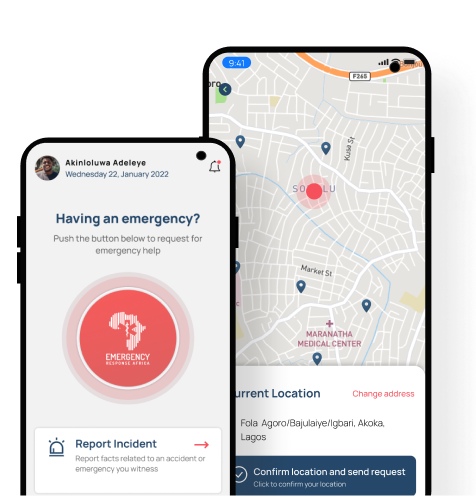Transporting a deceased body is a sensitive case in Africa, especially in Nigeria, due to the insecurity issues in the country. Factors considered, such as legal, cultural, and financial, come into play. This brief considers the Overview of Dead Body Transportation in Africa, focusing on Nigeria. This guide aims to provide clarity and support to families who have lost a dear one in these challenging circumstances.
Legal and Ethical Considerations for Dead Body Transportation in Nigeria
The legal and ethical grounds for dead person transportation should always be considered to avoid surprises. There is a legal framework that allows you to transport the human remains of a loved one, and this is to ensure public health regulation compliance and also to ensure that the remains are transported with dignity.
Legal Framework
The Public Health Act and Local Government regulation guides the transportation of dead bodies both within the country and those coming from abroad. These laws stipulate that for a dead person, there must be proper documentation carried out to allow for the movement of the dead body in a way that the deceased person is respected.
Ethically, families should consider the deceased’s wishes and maintain burial practices that support the culture and tradition of the deceased. Local customs and practices are held to a high degree in Nigeria when it comes to the transportation of dead persons, as the country is bound by religion and traditions.

Requirements for Shipping Human Remains to Nigeria
Transportation of a dead body requires you to meet these following according to the confines of the law.
General Requirements to follow:
- Documentation: Check to confirm that you follow the requirements, such as getting a death certificate, an embalming certificate, and a permit for transporting human remains from the local government authority.
- Embalming: It is not only a legal requirement for the body but helps preserve it while in transit. It is generally required that the body be embalmed before transportation.
- Coffin Specifications: The coffin should meet the requirement according to world standards, typically including a sealed container to prevent leakage and odour.
DOCUMENTATION FOR SHIPPING HUMAN REMAINS TO NIGERIA FROM ABROAD
- Copy of Death Certificate.
- Copy of Transit/Burial Permit.
- Original Copy of Non-Communicable Disease Letter issued by Coroners, Medical Examiner or State/City Health Agency.
- The original notarized Embalmers Affidavit stated how the body was embalmed.
- Original Notarized Letter from Funeral Home stating that the body has been placed in a hermetically sealed metal casket.
- The deceased’s Nigerian Passport (if not available, a relative with a valid passport should swear a notarized affidavit stating their relationship and that the deceased is a Nigerian).
- $30.00 (Thirty Dollars) Postal Money Order or Certified Bank Cheque as processing fee, made payable to the Consulate General of Nigeria, Atlanta.
- Contact Name, Address and Telephone Number of the receiving party in Nigeria.
- A self-addressed stamped express mail envelope should be enclosed with all the above documents for sending the Permission Letter.
- A formal Letter from the Funeral Home asking the Consulate to issue a Letter for the Shipment of Human Remains to Nigeria.
- WAIVER FOR THE REPATRIATION OF CORPSE from the Federal Ministry of Health – Port Health Services, Abuja.
- Photocopies and Original Documents are required.
RELATED SERVICES:
Does a Dead Body Need a Passport?
The body does not need a passport to transport the deceased; however, proper documentation should be necessary for shipping. It allows the authorities to verify the deceased person’s identity and check for health compliance. It helps authorities verify the deceased’s identity and ensures compliance with international shipping regulations.
What to Do When Someone Dies in Nigeria
When a death occurs in Nigeria, there are several immediate steps that family members should take:
- Notify Authorities: Inform local authorities or the police about the death, especially if it occurs under unusual circumstances.
- Obtain a Death Certificate: This is typically issued by a medical practitioner or a hospital and is necessary for all subsequent processes.
- Engage a Funeral Home: Contact a reputable funeral home that can assist with the embalming and transportation of the body.
- Plan for Burial or Repatriation: Decide whether the body will be buried locally or repatriated to another country.
What Are Embalming Charges in Nigeria
Embalming charges in Nigeria can vary significantly based on the funeral home and the services provided. On average, you can expect to pay:
- For Bodies Brought from Outside the Hospital: Approximately ₦50,000.
- For Bodies that Die in the Hospital: Around ₦45,000.
These costs may increase depending on additional services, such as cosmetic preparations and special requests from the family.
Do You Have to Pay for Embalming
Yes, embalming is typically a paid service. It’s a process that families often choose to allow for more time to say their goodbyes. This service is key for preserving the body during transportation, especially for long distances or international shipping, ensuring that your loved one is treated with the utmost care and respect.
Embalming helps maintain a more natural look for the deceased, which helps to delay the natural decomposition process. Embalming helps to sanitize the body and slow the spread of bacteria. Families should inquire about the costs upfront and understand what services are included in the embalming fee.
Why Do You Need a Death Certificate to Transport a Dead Body in Nigeria
The following reasons are why a death certificate is needed:
- Legal Requirement: It is constitutional that any human remains before burial should have a death certificate, which the local government authority must sign, the National Population Commission, or the Ministry of Health.
- Documentation for Authorities: Customs and health officials at the borders need to be sure of the cause of the deaths and that a health issue does not cause it.
- Funeral Arrangement: The certificate will help the family plan for the deceased’s burial and for record purposes at the cemeteries.
How Much Does a Death Certificate Cost in Nigeria
The death certificate in Nigeria costs about cost ₦1,500 and ₦5,000 for the document; there might be charges on it, and the local authorities issue it.
The hospital and local authority usually change the price occasionally, so please check the centres to be sure about the pricing and procedures in case of any changes.
Emergency Response Africa
Our ambulance services in Nigeria are designed for rapid response, providing essential ambulance service to all our clients and prospects. We deliver transport service for your loved ones who have died in the morgues. We are well connected to the best morgues on the mainland and around Lagos.
RELATED SERVICES:
Each ambulance is equipped with the necessary medical equipment to meet the demands. Get an Ambulance in less than 20 minutes, ensuring you or your loved ones are quickly and safely transported to any of our morgues partners.
Trust us to be there when every second counts.




